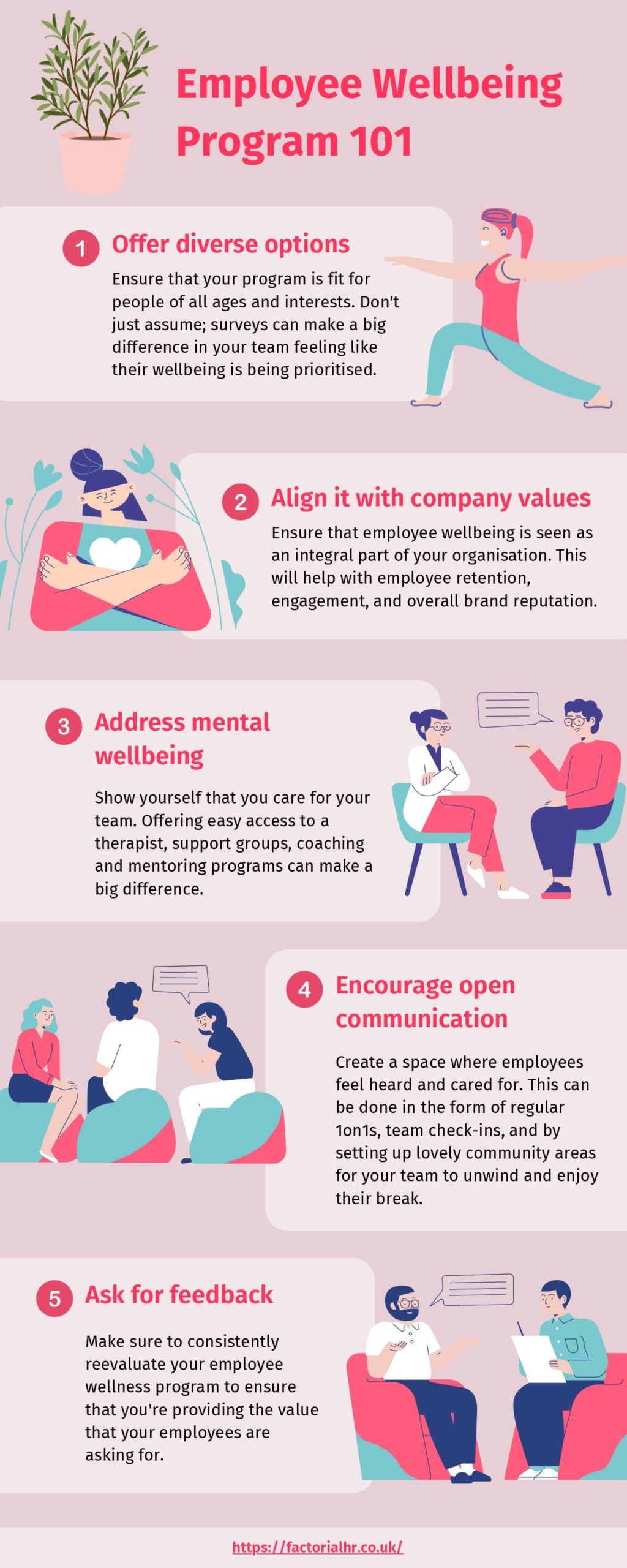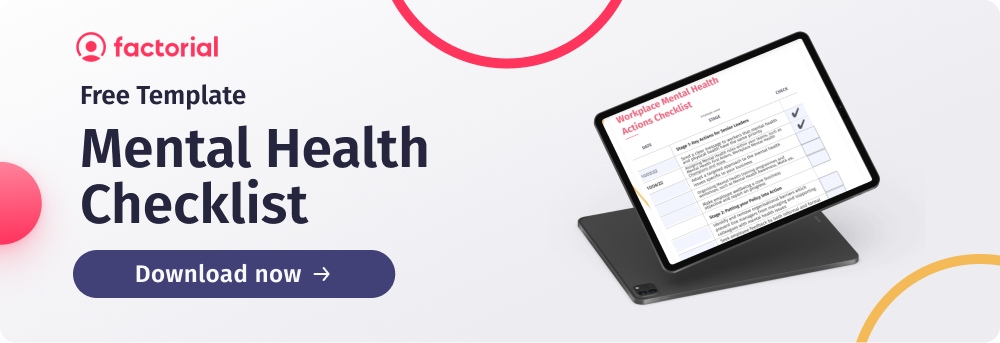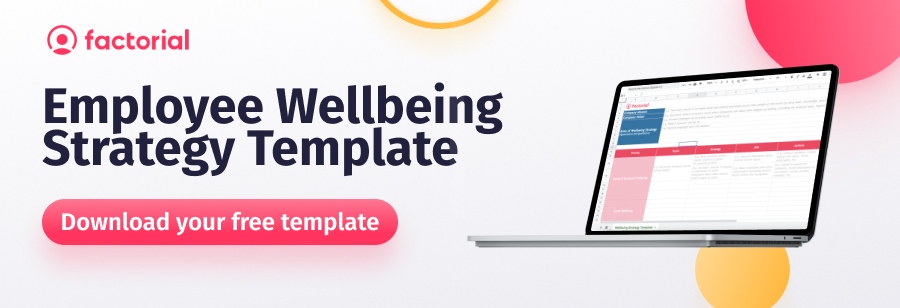Improving employee mental health at work is becoming more of a focus for HR teams. Recently, mental health in the workplace is becoming a key focus within the UK HR industry. As many as 1 in 4 people in the UK experience Mental Health issues in their lifetime. Therefore, it’s important for workers to know how to identify these issues and how to support their colleagues and employees.
Work can often be the main cause of mental health issues. Whether it’s due to work-related stress, anxiety, workplace bullying and more. Therefore, addressing mental health and positively promoting it to your employees, should be a priority and will positively contribute to employee motivation and satisfaction.
Mental Health at Work
Mental health encompasses many conditions, from common mental health issues like anxiety and depression to more severe conditions like bipolar disorder and schizophrenia. With that said, mental health in the workplace is not just about not having a diagnosable mental illness. It also includes emotional resilience, coping with stress, positive self-esteem, a sense of purpose and meaning, healthy relationships, and overall psychological well-being.
Mental health directly correlates with productivity. Surveys by the ONS found that almost 13% of all recorded sickness absences in the UK can be attributed to mental health, with 15.2 million work days lost. If left unattended, these circumstances will likely affect productivity levels and cause further concerns in your organisation’s absenteeism or presenteeism rates.
Importance of Educating Employees About Mental Health at Work
For a long time, there has been a huge focus on First Aid at work, but unfortunately, not on Mental Health First Aid (MHFA) Training. Thankfully, in recent years numerous organisations have curated training courses to help employees qualify as Mental Health First Aiders. And by implementing these programmes into your workplace, you are offering your employees the chance to speak to someone and overcome these issues before they become problematic.
Alternatively, workplace training isn’t the only way you can promote mental health awareness in the workplace. You can also do this by adopting simple yet effective practices such as regular one-to-ones, employee satisfaction surveys, free online screening tools, encouraging regular discussions and so much more.
There are many options available for Mental Health Training, including the following Government-funded courses:
- Awareness of Mental Health Problems
- Counselling in the Workplace
- Understanding behaviour that Challenges
How Can Absence Reporting Improve Mental Health at Work?
Research by the CIPD found that organisations with supportive absence policies reported higher levels of employee well-being and job satisfaction, with up to 96% of organisations taking the necessary steps to promote attendance. So much attention is placed on absence policy because absenteeism data lets you identify employee trends, assess the effectiveness of wellness initiatives, and develop targeted interventions, ultimately paving the way for informed decisions to address systemic issues and create a supportive work environment.
Additionally, leveraging insights gained from your absence management system allows organisations to offer resources such as employee assistance programmes, mental health support, and stress management workshops to address the specific needs of their workforce.
Want to know how to manage staff absence effectively? Here are a few organisational characteristics that showcase whether a company is doing things right.
Promoting Early Intervention and Prevention
Early identification of mental health issues through absence reporting enables organisations to intervene promptly. Recognising patterns of absenteeism related to mental health concerns allows you to provide necessary support and resources to employees at the earliest stages. Early intervention can prevent the worsening of mental health conditions and reduce the likelihood of long term absence, ultimately leading to better outcomes for employees and the organisation.
Reducing Stigma Around Mental Health in the Workplace
Absence reporting that specifically addresses mental health sends a powerful message to employees: the organisation values their well-being and is committed to creating a supportive environment. Employers can help reduce the stigma associated with these issues by openly acknowledging mental health concerns. When employees feel comfortable discussing their mental health and seeking help, it fosters a culture of empathy, understanding, and acceptance.
Enhancing Employee Well-being and Job Satisfaction
When organisations prioritise mental health through absence reporting, they demonstrate a genuine commitment to the overall well-being of their employees. This proactive approach fosters a sense of trust and loyalty among workers, as they feel supported and valued by their employers. Consequently, employees experience higher levels of job satisfaction, leading to increased engagement, motivation, and productivity.
What is Mental Health Awareness Month?
May is Mental Health Awareness Month in the UK. Every year Mental Health Awareness Week takes place during May each year, although every year it is a different date.
Mental Health Awareness Month aims to provide support to people struggling with mental health issues and to reduce stigma related to mental health. Although first observed in the United States in 1949, it has since grown into a global movement. It’s a month-long campaign typically observed in May on an annual basis.
The importance of mental health in the workplace can’t be overstated. Mental health is an essential aspect of our overall wellbeing. It affects how we think, feel and behave, and it impacts our daily lives – including our work.
As 1 out of 4 adults are now suffering from mental health issues, modern HR has taken on the task of creating a positive work environment and supporting employee wellbeing. Although workplace mental health itself should be acknowledged on a daily basis, mental health awareness month provides a great chance for employers to raise the bar higher in supporting mental health in the workplace.
8 Ways to Improve Employee Mental Health at Work
Host a Bring Your Pet to Work Day
As a business owner or manager, you’re likely always looking for ways to boost employee morale and productivity. Well allowing pets in the workplace is an effective way to do this; over four-fifths of UK employees believe pet-friendly workplaces are happier to work in! Here’s how you can implement a ‘bring your pet to work day’.
- Consider employee allergies and phobias. Set up designated pet-free zones in the workplace to accommodate those who may have allergies or phobias.
- Set rules and guidelines. Consider guidelines such as requiring pets to be vaccinated, on a leash or in a carrier.
- Communicate the event. Provide information on what types of pets are allowed and any rules or guidelines that need to be followed.
- Make it fun! Consider setting up activities or games for pets and their owners to participate in together. You could also provide treats and toys for pets to enjoy throughout the day.
Allowing pets at work can:
- Reduce stress and anxiety. Research has shown that petting an animal can lower stress hormones in the body. Allowing pets in the workplace can help reduce stress and anxiety levels among employees.
- Increase social interaction. Pets are great icebreakers. Bringing pets to work can lead to more social interaction among employees and create a sense of community within the workplace. This can help to improve employee morale and create a more positive work environment.

Create a Mental Health Resource Guide
Another way to support mental health in the workplace is by creating a mental health resource guide for your people. Follow these steps to create one.
- Identify the needs of your employees. Consider conducting a survey or focus group to gather information on the types of resources and support that would be most helpful.
- Carry out research. Collate information on mental health resources, EAPs and support services. This can include an array of information on self-care tips, local support groups and crisis hotlines.
- Organise the information. Structure your findings in a clear and concise manner. You may want to include a table of contents, index or section headers to make it easy for employees to navigate.
- Make it accessible. Make sure that the mental health resource guide is accessible to employees by distributing hard copies or sending it out via email. You could also host a lunch and learn session to introduce the guide and explain how to use it.
Mental Health Resource Guides can:
- Promote a culture of wellbeing. By providing resources and support for mental health, employers can create a culture of wellbeing that prioritises the mental health of employees.
- Increase awareness. A mental health resource guide can help increase awareness of mental health issues and reduce stigma in the workplace.
- Improve productivity. When employees feel supported and have access to mental health resources, they are more likely to be productive and engaged in their work.
Host Mental Health Workshops
Mental health workshops provide an opportunity for employees to learn more about mental health and develop strategies for coping with mental health challenges. To host your own, you should:
- Choose the right facilitator. Consider partnering with a mental health professional or an organisation that specialises in mental health.
- Determine the format of the workshop. Workshops can take many forms, from lectures to interactive sessions. It’s important to choose a format that will engage your employees and achieve your goals. You may want to consider incorporating activities that allow employees to practice new coping strategies or share their experiences.
- Promote the workshop. To ensure a successful turnout, you’ll want to promote the workshop well in advance. Use internal communication channels to spread the word. You can also go the extra mile and create posters to display around the office.
Training opportunities like this are important to:
- Provide coping skills. Workshops can teach employees coping skills for managing stress, anxiety and depression in the workplace.
- Encourage open communication. Workshops can provide a safe space for employees to share their experiences and feelings, which can help reduce stigma and encourage open communication about mental health.
- Improve employee morale. Workshops show employees that their employer cares about their mental health and wellbeing which can improve employee morale and job satisfaction.

Offer Mental Health Days
A study from the World Health Organisation found that anxiety and stress-related illnesses cost over 1 trillion dollars in lost productivity globally. A mental health day (or ‘duvet day’) is a paid day off for rest and rejuvenation that could help in supporting mental health and wellbeing in the workplace. When implementing these, employers should:
- Create a policy. Develop a clear policy outlining eligibility, how many days are available and any other relevant details.
- Communicate the policy. Make sure employees are aware of the policy and understand how to request a mental health day off.
- Encourage and support the use of mental health days off. Foster a workplace culture that supports mental health and encourages employees to take time off when needed.
Taking time off to focus on mental health can help employees manage stress and reduce burnout. In turn, this can lead to higher job satisfaction and improved overall health.
Offer Flexible Work Arrangements
Flexible work arrangements such as remote work have been suggested to support work-life balance and boost mental health at work. This can be especially beneficial for employees who are dealing with mental health challenges or who have caregiving responsibilities. Start by:
- Assessing needs. Determine which flexible work arrangements will work best for your team.
- Communicating. Communicate the policy clearly to all employees and make sure they understand the guidelines and expectations.
- Create regulations. Set clear parameters around working hours, deadlines and communication protocols.
Mental Health Care Kits
These kits are a tangible way to show employees that their mental health matters and that their employer cares about their wellbeing. Create these by:
- Budgeting. Decide on the budget for the mental health self-care kits. This will determine the types and quantity of items that can be included.
- Choosing items. Select items that promote mental wellbeing and relaxation, such as stress balls, aromatherapy candles, journals, colouring books, teas or bath bombs.
- Personalise the kit. Consider tailoring the kits based on employee preferences or needs.
- Add resources. Include mental health resources such as pamphlets or brochures on managing stress, mindfulness or self-care practices.
- Distribute the kits. Distribute the mental health self-care kits to employees, either in person or through mail delivery.
Items such as journals, colouring books, or puzzles can help boost mood and provide a positive outlet for stress. They also encourage self-care and act as a reminder for employees to take time to switch off and recharge.
Free Yoga Classes
One increasingly popular way to promote mental health awareness month is by offering free yoga classes at work. In fact, the WHO recently highlighted the importance of offering ‘leisure-based physical activity‘ to support mental health and wellbeing in the workplace and to combat depression. Start by:
- Finding a qualified instructor. Look for someone who has experience teaching in a corporate setting.
- Promoting the program. Create posters or flyers, send out emails or newsletters and post about it on social media to generate interest.
- Providing equipment. Make sure to provide the necessary equipment for employees, such as yoga mats and blocks. You can purchase these items or ask employees to bring their own.
This one has many benefits, including:
- Increased physical fitness. Yoga is a low-impact form of exercise that can help employees increase their physical fitness levels. Regular yoga practice can improve flexibility, strength, and balance.
- Improved mental health. Practising yoga has been shown to have a positive impact on mental health. It can reduce symptoms of anxiety and depression and improve overall wellbeing.
- Stronger community. Providing free yoga classes at work can give employees a shared hobby and something to bond over.

Gratitude Wall
Celebrating Mental Health Awareness Month is an important opportunity to promote workplace mental health. A whopping 20% of workdays lost in the UK have been attributed to mixed anxiety and depression, but showing gratitude is a proven way to minimise both. Follow these steps to create your own.
- Choose a space. This could be a communal area like a break room or a hallway.
- Set up the wall. Your wall could be as simple as a corkboard or a whiteboard. Be creative with the display – add some colourful paper, stickers or even pictures of team members.
- Provide materials. Provide materials for employees to write their gratitude notes. You can have sticky notes, pens or markers available for employees to use.
- Encourage participation. You can start by explaining the purpose of the gratitude wall and how it can promote positive mental health. Encourage employees to write down anything they’re grateful for.
- Keep it up! The gratitude wall shouldn’t be a one-time activity. Encourage everyone to continue using it throughout the year.
Showing gratitude can help reduce stress and anxiety by creating a supportive and respectful work environment. Gratitude can also help foster trust and respect among colleagues, leading to stronger working relationships and an empathetic company culture. It can also foster a sense of community and encourage team members to support each other, boosting mental health at work.
Employee Wellbeing Programme 101

FAQs
Can you dismiss an employee due to mental health issues?
In brief – the answer is yes. If your company is unhappy with the performance of an employee due to a mental health illness. By law, you must find a fair reason for dismissal. This reason may be that the employee is incapable of carrying out their job properly or the absence of the employee is affecting the business performance.
Alternatively, if the employee’s mental health disorder is classified as a disability, unfair mental health dismissal is illegal. In this situation, an employer must make any necessary changes to how the employee is working in order to improve their mental state. Employers can do this by adjusting working hours, offering appropriate aid such as software, or physical features in the office, such as disability aid.
What is mental health sick leave UK?
How long can you get paid on sick leave UK?
When is Mental Health Awareness Month in the UK?
May is Mental Health Awareness Month in the UK. Mental Health Awareness Week takes place during May each year. In 2025, it runs from 12-18 May.



